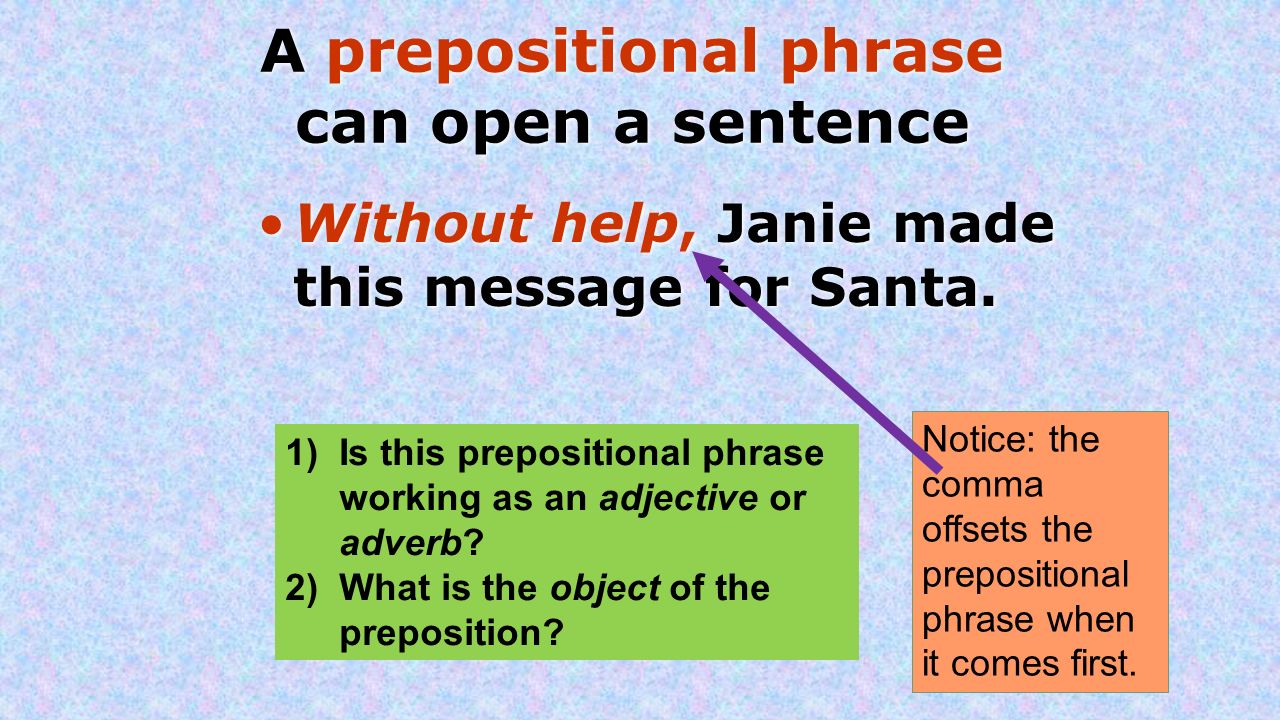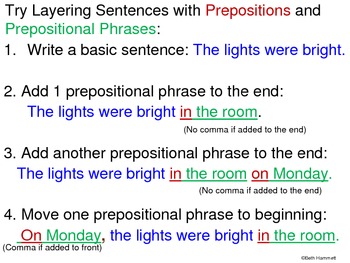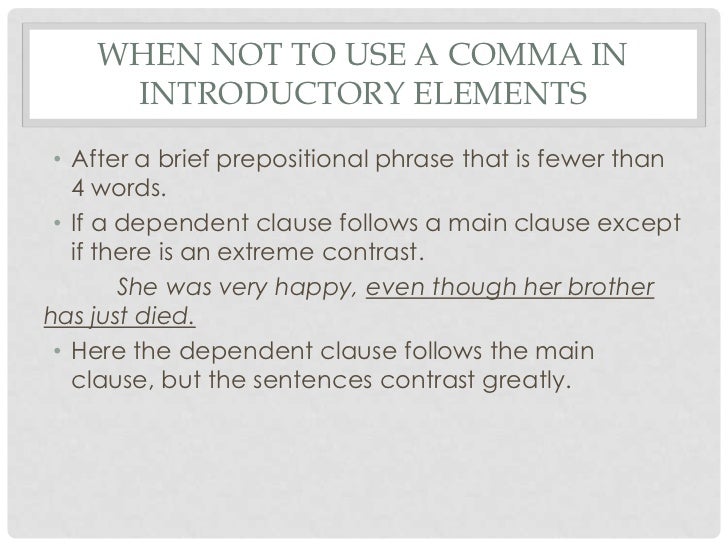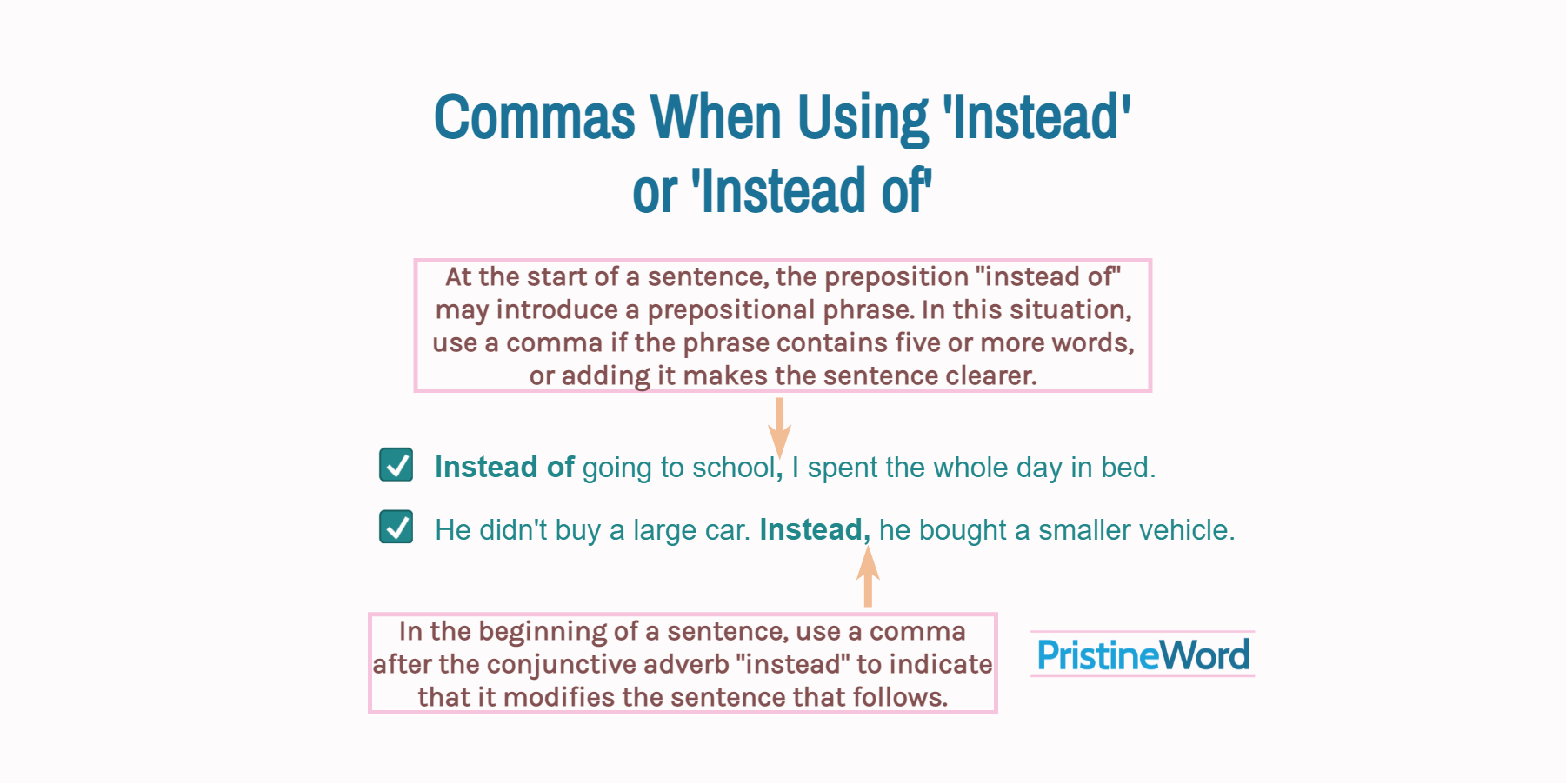Here’s an example of a prepositional phrase (in italics): For example, the purdue online writing lab says a comma is required after introductory prepositional phrases that are longer than four words.

Prepositional Phrases English 10 Preposition A Preposition Tells
If you begin a sentence with a prepositional phrase, it.

Starting a sentence with a prepositional phrase comma. The object of a prepositional phrase can be either a noun, gerund, or clause. The best way to start a sentence with a preposition is in an introductory phrase. The preposition underneath relates to the object that follows the preposition—the table.
In general, the longer the prepositional phrase, the more you need the comma. A prepositional phrase is a part of a sentence that consists of one preposition and the object it affects. If a prepositional phrase starts the sentence and is longer than four words, use a comma.
In the morning we got up and got ready for work. Commas after prepositional phrases at the beginning of a sentence when you start a sentence with a prepositional phrase, it's usually a good idea to put a comma after it (as in the examples above). Prepositional phrases of five or more words require a comma:
Commas after prepositional phrases at the beginning of a sentence. “when one prepositional phrase that is a simple modifier comes at the beginning of the sentence, put a comma after it if it is ‘long.’ ‘long’ is somewhere between four and five words.'”.on a good day we were able to do about 20 of them. Beyond the terrible tunnel through shelob’s lair, the orcs of cirith ungol lay in wait.
On time is the prepositional phrase. In the examples below, the introductory phrase contains two prepositional phrases: If a prepositional phrases contains four or fewer words, usually no comma is needed as in the following sentence:
Adjectives may be placed between the preposition and the object in a prepositional phrase. In the morning, we got up and got ready for work. Prepositional phrases at the beginning of sentences are common and grammatically correct.
A prepositional phrase that acts as an adverb answers the questions “how?” “when?”, and “where?”. In this sentence, the prepositional phrase is “with apples” because it composes the phrase that holds the object and the preposition. When you start a sentence with a prepositional phrase, it's usually a good idea to put a comma after it.
When your introductory phrase actually contains two prepositional phrases, it’s best to use a comma. The terrified child hid underneath the heavy wooden table. When you start a sentence with a prepositional phrase, it's usually a good idea to put a comma after it (as in the examples above).
For example, the sentence 'isaac and caroline stood on the porch' has a prepositional phrase, 'on the porch', but it does not need a comma. When does he wash the dishes? The prepositional phrase “from the principal” acts as an adjective to “the letter”.
Adverb phrases at the beginning of the sentence, now introductory prepositional phrases, are usually separated from the sentence by a comma unless they are very short (three words or fewer) and it is easy to tell where the phrase ends. After a short phrase a comma usually isn’t necessary. When two prepositional phrases come at the beginning of a sentence, without regard to how long or short each is, there is usually a comma after the second one.at the beginning of the night, we were….after all of that, we were….before dark on the 19th, we were….on saturday after lunch, we were…
Starting a sentence with a prepositional phrase comma. In the evening, he would wash the dishes. When you do this, you should usually place a comma after the phrase.
When you start a sentence with a prepositional phrase, it's usually a good idea to put a comma after it (as in the examples above). For example, the purdue online writing lab says a comma is required after introductory prepositional phrases that are longer than four words. For longer phrases, you should always use a comma.
Adverb phrases at the beginning of the sentence, now introductory prepositional phrases, are usually separated from the sentence by a comma unless they are very short (three words or fewer) and it is easy to tell where the phrase ends. (short phrase okay with or without a. She caught the bus on time.
In general, the longer the prepositional phrase,. Prepositional phrases may be attached to either nouns or verbs. But as you can see from these sentences, whenever a pause is intended, a comma does the trick.
In this sentence, the prepositional phrase is underneath the table. The prepositional phrase “in the evening” acts as an adverb of time. For example, in the sentence, i filled the baskets with apples.
On the table a bottle of champagne rested, conserving its energy for the upcoming festivities. After one that’s especially long or whose syntax involves more complex elements, it’s usually a good idea. No longer followed by a comma?
Beneath the dusty redwood table, the cat crouched with murderous anticipation. Are prepositional phrases separated by commas? “during the production” and “of the film.”.
After their journey across mordor, frodo couldn’t bear to drop the ring into the fire. So you may start your sentence with 'at'.

Commas And Prepositional Phrases - Youtube

Rule 1 For Long Introductory Phrases Put A Comma After A Long Introductory Prepositional Phrase 4 Or More Words Examples On This Beautiful Summer - Ppt Download

Expanding The Simple Sentence With Prepositional Phrases Lesson 2 After Flipped Classroom - Ppt Download
![]()
Nearpod
![]()
Nearpod

Introductory Prepositional Phrase - Youtube

Prepositions At The Beginning Of Sentences

Conquering The Comma What Is A Comma A Comma Is A Punctuation Mark That Indicates A Pause Is Needed In A Sentence Commas Help To Clarify Meaning For - Ppt Download

Learning Objective Combine Short Related Sentences With Prepositional

Prepositional Phrases A Prepositional Phrase Begins With A

With Prepositional Phrases - Ppt Download

Major Comma Uses
![]()
Nearpod
English Grammar More - Question In A Sentence How Do You Identify Introductory Phrases Parentheticals And Series What Is A Phrase A Phrase Describes A Set Of Words That Convey A

Expanding The Simple Sentence With Prepositional Phrases Lesson 2 After Flipped Classroom - Ppt Download

Prepositions And Prepositional Phrases Active Learning Approach

Comma After Today At Beginning Of Sentence

Commas After Introductory Material

Commas When Using Instead Or Instead Of
